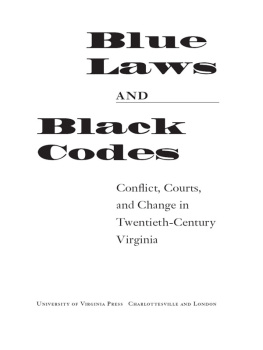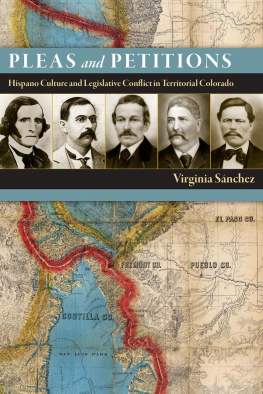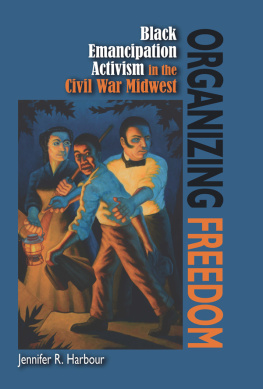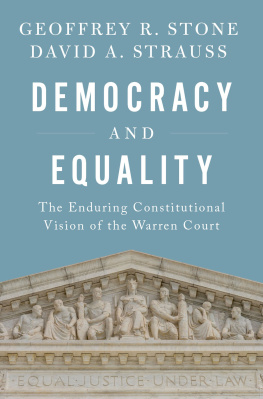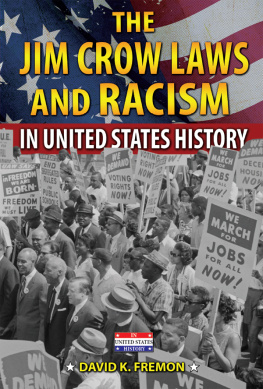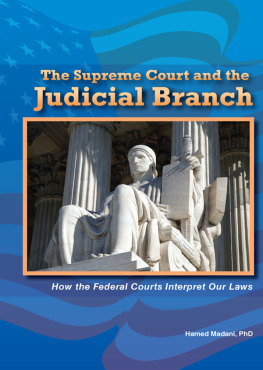University of Virginia Press
2004 by the Rector and Visitors of the University of Virginia
All rights reserved
Printed in the United States of America on acid-free paper
First published 2004
9 8 7 6 5 4 3 2 1
LIBRARY OF CONGRESS CATALOGING-IN-PUBLICATION DATA
Wallenstein, Peter.
Blue laws and Black codes : conflict, courts, and change in twentieth-century
Virginia / Peter Wallenstein.
p. cm.
Includes bibliographical references and index.
ISBN 0-8139-2260-7 (cloth : alk. paper)ISBN 0-8139-2261-5 (pbk. : alk. paper)
1. LawVirginiaHistory. 2. Civil rightsVirginiaHistory.
3. Social changeVirginiaHistory. I. Title.
KFV2478 .w35 2004
340'.115'09755dc22 2003015695
Preface
I N THE 1980s I RETURNED TO VIRGINIA AFTER MANY YEARS AWAY and began teaching at Virginia Tech, where I found an abundance of intriguing yet neglected topics in Virginia history. At that point I was finishing a long-term project on public policy in the Deep South in the nineteenth century, and I soon turned my attention to similar matters for the Upper South in the twentieth century. Much was very different, of course, but the focus of my work continued to be on public policy and legal history, as these themes relate to education, transportation, racial identity, the exercise of power, and everyday life.
The chapters of this book began life as stand-alone pieces, whether conference papers or even brief reference entries. Several chapters at one time or another struck me as opening up promising areas of inquiry for entire books by themselves: on the history of the Virginia Supreme Court; race and gender in the legal profession; litigation comprising the case against Jim Crow in Virginia; the 1960s southern sit-ins and the resulting court cases. My work on the law of interracial marriage has, in fact, led to an entire book, one that covers 300 years and every part of the nation: Tell the Court I Love My Wife (2002).
Regardless, these particular topics have long seemed to belong together. I have in mind, as I usually do in my books, two audiences: fellow academics and general readers. For members of the academy, I think I have fresh things to say on every subject, on particular issues and on broader questions. To my fellow citizens I offer a series of engaging stories, each designed to illuminate how the legal and political systems have operated regarding various issues in one American state over the past hundred years. To both groups, I have wanted to demonstrate how, often through citizens day-to-day activities and the day-to-day workings of political institutions, a not-so-distant past became such a different present.
To students in courses in Virginia history, the Civil Rights movement, American politics, legal history, southern history, or the twentieth-century United States, I wish to tell you that I originally wrote a number of these essays for students in my classes, particularly my Virginia history classes. In fact, though, I did not do it all. I believe in undergraduate research at a research institution; and various undergraduates, as well as graduate students, did work that has contributed toward the making of this book. For my students as well as myself, the teaching and the research were related facets of one enterprise.
I have placed acknowledgments at the start of the notes to each chapter. Yet here is a good place to express my indebtedness to the Virginia Foundation for the Humanities and Public Policy, which twicein summer 1989 and summer 1992provided me with space and funds in Charlottesville, where I did much of the work on . I wish to salute my colleagues at the Virginia Center for the Humanities, especially several fellows from 1989: Hoda Zaki, Rafia Zafar, Paul Gaston, and the elder statesman from China among the group, whom we affectionately called Professor Shi. I am grateful, too, to the Virginia Tech Department of Historys Frank L. Curtis Fund, which supports research in Civil War or Virginia history. I began trying out my emergent ideas regarding Virginia history at annual meetings of the Virginia Social Science Association, and I subsequently published small portions of this book in the Virginia Social Science Journal. I wish to acknowledge my friends and associates in the VSSA during the years I was most active in the organizationespecially Bernard Bud Levin of Blue Ridge Community College; Greg Weiss of Roanoke College, editor then of the Journal; and political scientist John Ramsey and geographer Don Zeigler, both of Old Dominion University. Here, too, I wish to express my appreciation for the encouragement that came from Kermit Hall and Paul Finkelman as I worked on this book, as well as the astute comments that J. William Harris and Charles W. McCurdy offered in the closing stages. Virginia Tech undergraduate Erin Mooney assisted with the index.
I wish also to thank several people who shared with me their own compelling stories. Without their voices, several chapters would have been less substantive and less accurate. In particular I have in mind Elsie Tucker Thomas, Oliver W. Hill, Roland D. Ealey, Ford T. Johnson Sr., and Ford T. Johnson Jr. for various dimensions of . I hope that I have recounted their stories in ways that they will recognize as authentic and that others will find accessible and illuminating.
As for dedications, this book is for the many members of my extended family. It is in memory of my grandparents, the Wallensteins and the Van Duynes, children of the nineteenth century; my father, Crandall R. Wallenstein; my uncle Raymond Van Duyne; and my cousin Frank Wallenstein. It is for my younger brothers and sistersCkris, Andy, Kathe, Nancy, Mark, Holly, and Faithand my mother, R. Carol Wallenstein. It is for Colton Wallenstein, the family patriarch, and for the children and grandchildren of my brothers and sisters, the newest additions among them children of the twety-first century. And it is for Sookhan, always.
Introduction
Amending Virginia, Amending America
L AWYERS ARE MEN. COLORED PEOPLE CANNOT MARRY WHITE people. Public amusements must remain closed on Sundays. On these and other matters, popular beliefs and public policy underwent changes so dramatic in the past hundred years, Virginia in the 1990s was hardly the same place as Virginia in the 1890s. This book explores the transformation.
Blue Laws and Black Codes emphasizes the past century or so in the history of one state. Yet, in degree, Virginia can stand as a proxy for the entire South, even the entire nation (indeed for much of the world), as traditional ways of doing things and governing behavior have undergone change, have even disappeared, and new ways have come to the fore. Thus, while my book uses materials from the history of Virginia, it raises and addresses larger questions, first in the legal history of the U.S. South, second in American political culture. The first three chapters could perhaps have been largely crafted from materials on any American state. The next three, in particular, derive far more from the legal history of the South. The ways in which the later chapters differ from the earlier ones can help define what is southern about southern history.
Changing a Constitution through Judicial Interpretation
Exploring the history of Virginia in the years since the Civil War,

